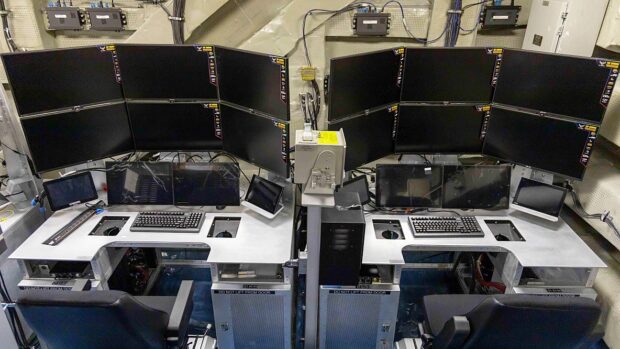The US Navy recently installed the world’s first Unmanned Air Warfare Center (UAWC) aboard USS George H.W. Bush (CVN 77), where Air Vehicle Pilots (AVPs) will control future MQ-25 Stingray airborne operations.
This major installation was a multi-year effort coordinated across multiple ship availability periods and the ship’s deployment schedule.
The CVN-based control room, known as the UAWC, includes software and hardware systems that make up the first fully operational and integrated Unmanned Carrier Aviation Mission Control System (UMCS) MD-5E Ground Control Station (GCS). UMCS is the system-of-systems required for the MQ-25 air vehicle command and control and is critical to the unmanned aircraft refueller’s operations.
“CVN-77’s UAWC lays the foundation for how the U.S. Navy will operate and control unmanned aircraft, and perhaps other unmanned vehicles, with UMCS,” said Unmanned Carrier Aviation Program Office Manager Capt. Daniel Fucito. “These systems will initially support the MQ-25 but also future unmanned systems, such as Collaborative Combat Aircraft, that comprise the Air Wing of the Future.”
The GCS, developed by the Navy, includes Lockheed Martin’s Skunk Works Multi Domain Combat System (MDCX), the power behind the GCS, along with additional supporting equipment and hardware. The hardware installed in the racks and cockpits is the baseline for the production systems currently being fabricated for installation on CVNs 70, 71 and 76 beginning in fiscal year 2025.
“The support we received from all the organizations was incredible,” said Gordon Carlon, acting UMCS CVN installation lead. “Our program is accomplishing things on a much faster timeline than any other normal startup program.”
The program office’s UMCS team worked with multiple program offices, systems commands and shipyards to integrate the UAWC into existing networks and the carrier architecture. The Naval Air Warfare Center Aircraft Division Webster Outlying Field Alteration Installation Team, AirWorks and Lockheed Martin assisted with the coordination and physical installation of the UAWC while Naval Sea Systems Command, Norfolk Naval Shipyard and CVN-77 organized schedules, equipment and logistics.
Early next year, CVN-77 will lead the first at-sea testing of the UAWC’s operational networks, building on initial network testing with a simulated GCS that took place in January aboard USS Abraham Lincoln (CVN 72).
“This will be the first time the AVPs from Unmanned Carrier-Launched Multi-Role Squadron (VUQ) 10 will operate the MD-5 from an aircraft carrier. They will use the actual GCS hardware and software aboard CVN-77 to communicate with a simulated air vehicle in the lab in Pax River,” said Joe Nedeau, program office UMCS lead.
The program office is the lead systems integrator for MQ-25, working closely with its two prime industry partners, Boeing and Lockheed Martin, to integrate seamlessly the MQ-25 into carrier operations, including deck handing, taxiing and launch and recovery. When operational, MQ-25 will provide an aerial refueling capability to extend the range and flexibility of the carrier air wing.
Photo: The first installation of the Unmanned Air Warfare Center (UAWC) aboard USS George H.W. Bush (CVN 77), where air vehicle pilots will control future MQ-25 Stingray airborne operations.

